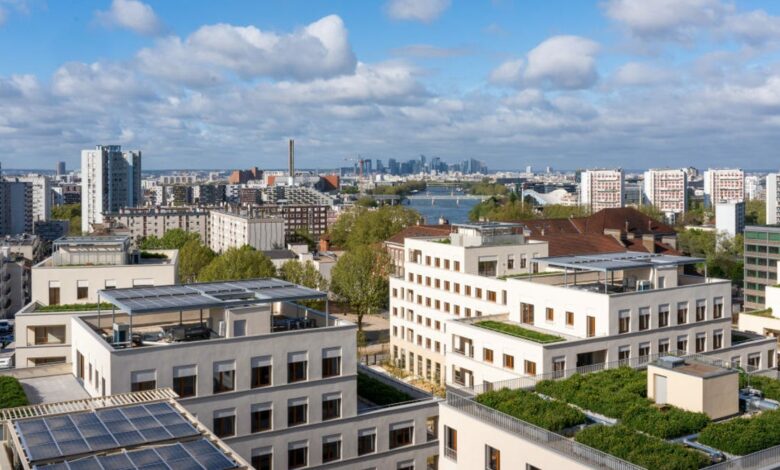The Olympics have big plans to save energy. Can you learn from them?



The Paris 2024 Olympic Games are fast approaching with big promises of the greenest Games ever. The Olympic Games Legacy and sustainability The plan outlines ambitious ideas to reduce carbon emissions, minimize waste and use renewable energy sources.
In the plan, Paris set targets to cut carbon emissions by more than half compared to previous Games, from an average of 3.6 million tons to 1.5 million tons. This means Paris believes it can produce fewer emissions than the 2021 Tokyo Summer Games, which banned spectators. Before Tokyo, the London and Rio Olympics had 3.4 million tons and 3.6 million tons of carbon emissions.
“Live events are great at showing what’s possible. We have the opportunity to make an impact on the audience because we’re visible. You may not know what your utility is doing, but events of this magnitude really put ideas in the spotlight,” said Neel Vasavada, an advisory board member at MUSE, an organization for leaders in sustainable events.
Despite the challenges of large-scale events that contribute to climate change, Paris sets a high standard for sustainability. While only time will tell if the promises will be fulfilled, we can learn valuable lessons from the Olympics to add more sustainable habits to our daily lives.
Don’t try to fly
The Olympic Games are encouraging athletes, spectators and other attendees to travel to Paris by train instead of flying, as trains emit harmful gases. considerably less carbon than aircraft. During the Games, every venue will be accessible by public transport, making it easy to choose this option over high-emission vehicles.
“A big part of it is travel. No one really knows what fan travel looks like,” Vasavada said.
Determining the exact emissions related to travel for 10,500 athletes, 45,000 volunteers, 20,000 journalists and millions of spectators will probably require a lot of estimation. In reality, people like comfort and familiarity. Many participants may still choose to use their own car or take a flight.
How to do it
Consider replacing your transportation with less energy-intensive options. Whenever possible, try to bike or walk instead of driving. If you’re traveling a longer distance, try public transportation, such as a bus or train, instead of driving or flying. If you must drive, try to carpool or use an electric vehicle to reduce your carbon footprint.

Paris is expecting more than 11 million visitors for the Olympic Games. France is encouraging visitors to use public transport, including the metro, as much as possible to reduce carbon emissions.
Use clean energy
All Olympic venues in Paris will be powered by 100% renewable energy from wind and solar farms in France. During the Games, Paris will set up temporary installations to cover some of the athletes’ consumption, including a floating solar farm on the River Seine. In addition, the Games will use the public electricity grid, which will be powered primarily by nuclear energy, a zero-emission energy source, instead of diesel generators.
How to do it
If you have a generator that runs on diesel or another fossil fuel like natural gas, consider replacing it with battery energy storage. The initial cost can be intimidating, but you can save 50% over the long term compared to the cost of fuel, Vasavada says.
Installing solar panels is another way to save money on energy bills and reduce your home’s carbon emissions. If installing solar panels isn’t a good fit for your budget, you can still support renewable energy in other ways, such as subscribing to a community solar program. Or, if you live in a deregulated energy market, opt for a 100% green energy plan. Either way, you’ll be contributing to sustainable efforts in your state.
“In a world where people don’t want to try sustainability because it’s expensive, they’re actually leaving money on the table. It can help save money and benefit your health and climate change at the same time,” Vasavada said.
Eat more sustainably
Portion 13 million meals is no small feat. The Paris 2024 Olympics pledged to halve the carbon emissions of the average meal. To achieve this, they doubled the portions of plant-based ingredients, sourced local ingredients, and reduced food waste through better estimating and composting. Another step is to reduce single-use plastics by implementing other solutions, such as using reusable bottles for water and other beverages.
How to do it
While you may not be feeding 10,500 athletes every day, choosing locally grown produce and food is good for the environment. Shopping local reduces emissions and saves energy from food transportation and production. When eating out or at home, choose reusable containers and utensils to reduce waste and save energy used to make disposable items.
Reuse, rent, recycle
Paris 2024 will save energy through sustainable location choices, reduced equipment needs and use of rented equipment, all of which will contribute to lower energy consumption during the Games. Focused on a long-term use strategy, 95% of the competition locations were already in existence or were built using low-emission building practices. All newly constructed buildings have a purpose and plan for use after the Olympics. Within the buildings, the amount of furniture and equipment was reduced by 200,000, encouraging shared use.
More than 75% of the equipment for the Games is rented, including stands, tents, chairs and computers. After the Olympics, 90% of the assets are reused and the organizers are making a second life plan for all remaining materials.
How to do it
Instead of buying new, consider rented or recycled options first. Whether it’s clothing, tools or equipment, choosing rented items reduces energy use and minimizes environmental impact compared to buying new.
The big idea
The Paris Olympics remind us that while individual actions matter, the fight against climate change is a collective effort. You can do your part, but it is up to large and influential companies and systems to make a difference in the world.
“We need to change the culture as much as anything else. There’s a lot of effort to unmask why this can’t happen, but Paris has the opportunity to show that the Olympics can be more efficient and can be repeated for years to come. Opportunities start when we reduce fossil fuels,” Vasavada said.
Can Paris really deliver on these lofty goals or are these claims yet another case of greenwashing? While the sustainability plans are promising, the results are what matter most.





